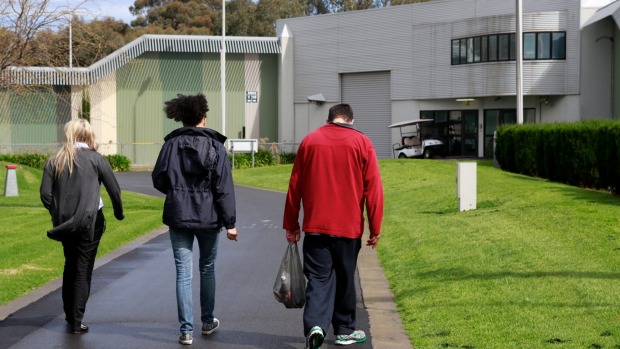
Thomas Embling Hospital is described as ‘bursting at the seams’. Photo: Eddie Jim
Mental health services, including those for prisoners and the state’s most acutely unwell, are stretched to the limit, the sector and unions say.
The industry says community treatment teams have been hurt by a lack of investment in the sector while the Thomas Embling Hospital at Fairfield is facing rising demand on the back of an “unique” explosion in the prison population.
Last year the Health and Human Services Department prepared a master plan mapping out the next 10 years of forensic mental health services in Victoria. It is yet to be released.
The high-security Thomas Embling psychiatric hospital serves patients from the justice system as well as highly acute patients from the public. It has been described by the Health and Community Services Union as “bursting at the seams”.
Chairman of the Victorian Institute of Forensic Mental Health Bill Healy said last year that the hospital was only designed to service a prison population that was 40 per cent of what it is now. Writing in Forensicare’s annual report Mr Healy said there had been as “extraordinary increase” in the prison population in the past three-four years, many of whom needed specialist mental health services
“The human impact on prisoners with a mental illness, correctional staff and clinical staff where mentally ill prisoners are waiting more than 30 days for involuntary treatment is concerning to myself and the board,” Mr Healy said.
The former government was briefed on some of the options in the master plan just before last November’s election, including expanding services at Fairfield or building a new acute forensic service at another site.
Labor promised to create a 10-year mental health plan including services for those in the justice system and that plan is currently being developed.
Extra mental health capacity in prisons will be created by the Ravenhall prison, which was signed off by the Napthine government – it includes 75 mental health beds as well as services for another 100 patients.
The health union’s state secretary, Lloyd Williams, said there were continuing concerns about the lack of investment in mental health in the state.
He blamed the previous Napthine government, saying Victoria had dropped to the state with the lowest investment in mental health than any other state.
“You end up with a crisis driven, squeaky wheel situation, where people in the most difficulties get the most focus,” Mr Williams said.
“The demand on staff is so high because they are so stretched. People are burned out and new graduates aren’t joining the system as it is overworked.”
With a more reactive system it was easier for people to fall through the cracks, he said.
The former government said it had increased funding to community mental health services by 30 per cent.
Other issues dogging the sector include an ageing workforce and the ability to attract and retain staff.
The peak body representing community managed mental health services Vicserv’s chief executive, Kim Koop, said the expectation on mental health services were high but “resources don’t allow these expectations to be met”.
Minister for Mental Health Martin Foley said the government was working on its promised 10-year plan, which would include planning for forensic mental health services and services for patients from the criminal justice system.
“The former Liberal government’s preoccupation with funding prison beds instead of forensic treatment beds and facilities has created the situation where a significant number of prisoners with mental health conditions and illnesses have not been getting the treatment they need,” Mr Foley said.
